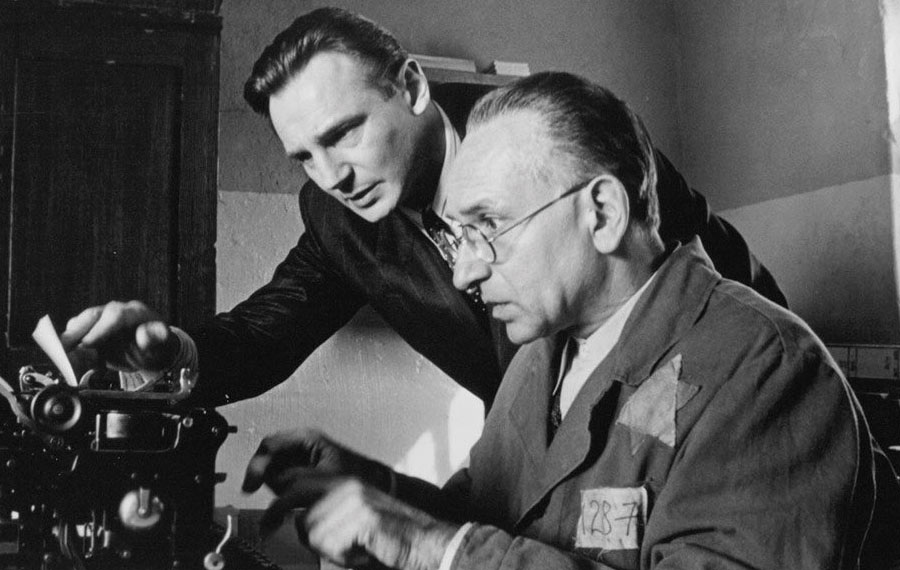
In third grade, the social studies teacher at the Hebrew day school I attended flipped off the lights and switched on an 8mm projector. Looking back, I suspect he didn’t trust his words to adequately convey what we were about to see.
The newsreel, the kind my parents watched in movie theaters at the end of World War II, showed scenes from the liberation of Auschwitz.
Images from that film stay with me to this day — such as the man with sunken cheeks, bones sticking out under his striped prisoner’s uniform staring blankly into the camera.
I knew that his eyes would haunt me for the rest of my life. I wondered what he might have said if given the chance.
Thirty years later, I stood inside Grand Central Terminal in New York as the nonprofit I founded, StoryCorps, opened its first booth. Its goal was to encourage everyday people to interview a loved one and to celebrate the stories we can find all around us when we take the time to listen. Since that day, more than 500,000 Americans have recorded StoryCorps interviews, each of which will live forever in the Library of Congress.
As we mark the 15th anniversary of StoryCorps, I’m reminded that it’s also the 25th anniversary of another effort to illuminate, honor and preserve the human story: producer-director Steven Spielberg’s masterpiece “Schindler’s List.”
My appreciation for the film and for Spielberg is rooted in his belief that there are few actions more important than reminding people that their lives and stories matter. That they won’t be forgotten. That they are not alone.
I spent the days leading up to Thanksgiving debating whether it was time for my 10-year-old son to watch this film.
My son has been asking me questions about the Holocaust for years, but it’s hard to know when the time is right for your child to have that moment, the one I’d had all those years ago.
So while thinking about “Schindler’s List,” I shared with him a StoryCorps interview. In it, Debbie Fisher asks her father to tell her about Auschwitz. Her father had always downplayed his experiences there as a child, insisting that she not “knock on the door.” But when he was gravely ill in the hospital, she knocked one last time. He said, “I’ll let you in, but if I let you in this room, you will never, ever get out. Do you want to come in?”
After a few days, my wife and I decided it wasn’t the right time to let our son in the room.
But late one night recently, I sat down and screened the film alone. As I watched Amon Goeth stand on his balcony and casually pick off Jews with his rifle, I was transported back to my third-grade classroom.
I thought about the word Untermenschen — subhuman — which the Nazis used to call Jews,
blacks, the disabled — anyone who posed a threat to an Aryan “master race.” I thought about how they branded people in concentration camps with numbers, not names.
Which is to say: They didn’t think of them as human beings at all.
This is why, 25 years after its debut, “Schindler’s List” matters more than ever.
Rabbi Abraham Joshua Heschel once said, “Words create worlds.” He would remind his children that the Holocaust didn’t start with the gas chambers. It began with words. With Hitler putting calculated, dehumanizing speech out into the ether.
In the United States today, words of loathing and disgust directed at fellow human beings — whether they be asylum seekers or those we disagree with across political divides — are in the air as they have never been in my lifetime. Something dangerous and toxic has been unleashed in this country and it demands our attention.
Let’s be clear. Are we in 1930s Germany? No.
Are we treating one another in ways that could lead us further down an extremely perilous path? Unfortunately, yes.
With StoryCorps’ new initiative, One Small Step, we are, for the first time, putting strangers across the political divides together in StoryCorps booths, not to talk about politics, but to be reminded of the fact that we are all living, breathing human beings. We hope to convince our countrymen that it is our patriotic duty to recognize the humanity in people who we may have regarded as “the other.”
So far, One Small Step has been working in all the ways StoryCorps hoped it would. Looking another human being in the eyes and asking, “Who are you?” “What lessons have you learned in life?” “How would you like to be remembered?” reminds us that listening is an act of love. Coming face to face with the stories of strangers we may have feared — or even hated —reminds us of our shared humanity.
History has taught us what can happen when we forget those inviolable truths. History also has shown what can happen when the world hears the voices of the most vulnerable among us, as they did a quarter of a century ago in Spielberg’s film. Numbers became names.
Soon after the release of “Schindler’s List,” Spielberg created the Shoah Foundation to ensure
that the voices and memories of all Holocaust survivors could whisper in our ears forever; that their words would help to create a different world, where we listen to one another, where we recognize that what’s at stake are individual human lives, not statistics.
That’s the world I want my son to grow up in.
I await the day when my son watches “Schindler’s List.” He’ll knock when he’s ready to come in the room.
And just as Debbie’s father did for her, I’ll open that door, and sit right there beside him.
Dave Isay is the founder and president of StoryCorps.




















 More news and opinions than at a Shabbat dinner, right in your inbox.
More news and opinions than at a Shabbat dinner, right in your inbox.